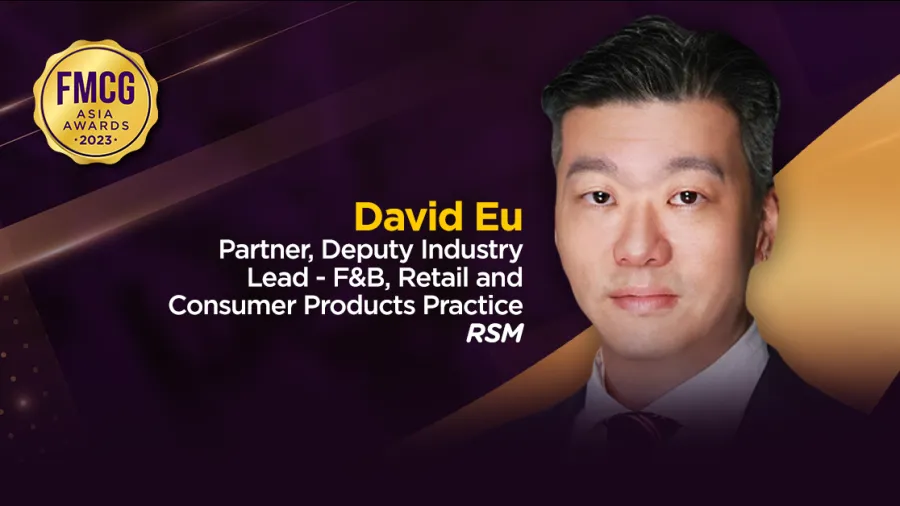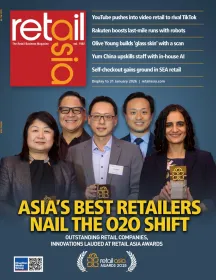
RSM's David Eu delves into FMCG challenges, sustainability, and innovation in Asia
Gain valuable perspectives on how the dynamic FMCG sector is adapting to the ever-changing market landscape.
The FMCG industry, particularly in Asia, faces a myriad of challenges and opportunities, from effective retail execution to sustainability and innovation. With the right strategies and adaptations, companies in this sector are poised to thrive in a rapidly changing market.
David Eu, Partner at RSM, who co-leads the F&B, Retail, and Consumer Products Practice, has extensive experience and knowledge in the industry, particularly in how companies are tackling sustainability and innovation.
David started his career in 1994 at Ernst & Young, where he managed audits for a diverse range of clients. He joined RSM in 2007. His portfolio includes diverse companies, from manufacturing and trading to retail and food & beverage establishments.
In this interview, he discussed the challenges and opportunities in FMCG, sustainability and environmental impact, and innovation in FMCG, amongst other key topics.
As a co-leader of RSM's F&B, Retail, and Consumer Products Practice, could you elaborate on the unique challenges and opportunities you've observed within the FMCG industry, particularly in Asia?
FMCG companies operate in a dynamic and ever-changing environment, marked by diversity in consumer preferences, market trends, and product offerings. This diversity drives innovation and fosters a culture of adaptability, but it also presents a unique set of challenges.
One such challenge is the imperative of effective retail execution. Given the sheer volume of retail outlets and the ever-changing inventory turnovers, ensuring that products are consistently available at the right stores, with accurate pricing and quantities, remains an important concern for FMCG companies.
Additionally, the vast amount of data generated, from sales to social media, offers valuable insights, but it can often be overwhelming. FMCG companies need to have the right tools and expertise to identify the most relevant data and use it effectively to make informed decisions.
Fragmented supply chains that rely on multiple suppliers can hinder stability and timely product delivery. FMCG companies need to work closely with their suppliers to build strong relationships and collaborate on supply chain management.
FMCG companies encounter other general challenges, such as rising raw material and packaging costs, heightened competition from private labels, evolving consumer preferences favouring healthier and more sustainable products, and a surge in e-commerce trends.
At the same time, as the FMCG industry continues to evolve, this presents a number of unique opportunities for companies that are able to adapt to the changing needs of consumers.
For one, e-commerce is growing rapidly, and FMCG companies are investing in technology to improve their online presence and track their products through the supply chain for better consumer insights. Additionally, as consumers in Asia become more aware of the importance of sustainability, it creates opportunities for FMCG companies to develop new products that are healthier, more sustainable, and meet the specific needs of different consumer groups.
Continuous innovation, from product development to marketing strategies, is vital for FMCG companies to meet ever-changing consumer preferences and embrace emerging technologies.
FMCG companies are capitalising on these opportunities in various ways. They deploy RFID tags to track products in real-time, enhance supply chain management, and ensure timely product availability for consumers. Moreover, they're venturing into the development of healthier and more sustainable products. This includes plant-based foods and beverages and products crafted from recycled materials, aligning with shifting consumer preferences. Data analytics also play a pivotal role in their strategies. By harnessing data, FMCG firms identify top-performing products, pinpoint underperformers, and predict the success of new offerings. Furthermore, they are heavily investing in e-commerce, selling products directly to consumers through their own websites and online marketplaces.
The FMCG industry often faces challenges related to sustainability and environmental impact. Could you provide insights into how companies in this sector are approaching these challenges and integrating sustainable practices into their operations?
In the FMCG industry, sustainability and environmental impact have become paramount concerns in recent years. Companies operating in this sector are proactively addressing these challenges by adopting a range of sustainable practices throughout their operations.
One fundamental approach is the adoption of eco-friendly materials in their packaging and products. This includes using recycled materials, biodegradable materials, and compostable materials. Furthermore, these companies are optimising their production processes to reduce waste and emissions. This includes the incorporation of energy-efficient equipment and the implementation of water recycling systems, ensuring that resources are used more efficiently in the manufacturing process.
A critical aspect of sustainability in the FMCG industry is the development of sustainable supply chains. This includes sourcing ingredients and materials from sustainable sources and implementing eco-friendly transportation practices using fuel-efficient vehicles. Another area concerns communication and transparency, both of which play pivotal roles in integrating sustainable practices. FMCG companies are becoming more transparent about their sustainability efforts and are effectively communicating their progress to consumers and stakeholders, thereby fostering trust and accountability.
Innovation is a key driver in the FMCG industry. Can you share some innovative approaches or strategies that you've seen companies adopt to stay competitive and capture consumer interest?
Innovation is a driving force in the FMCG industry, and companies are constantly exploring creative strategies to remain competitive and captivate consumer interest.
One example comes from KFC Hong Kong, which showcased innovation in its marketing campaign for the Fing Fing Cajun Chips. They devised a series of visually engaging billboards that incorporated an optical illusion, making it appear as though the billboards were swaying back and forth. This unique and attention-grabbing campaign was a hit with consumers and generated significant social media buzz.
Heineken is another brand known for its innovative marketing. In 2023, Heineken announced that it would be setting up a new global innovation hub in Singapore. This hub aims to focus on developing new products and services that are tailored specifically to meet the evolving needs of consumers in the Asia Pacific region. Additionally, Heineken partnered with fashion influencer Motherchuckers to launch a limited-edition streetwear collection. This collaboration effectively connects with the Gen Z consumer demographic, who are known for their love of fashion and streetwear trends.
Speaking of Gen Z consumers, this demographic is particularly interested in new technologies, such as the metaverse, AI, ChatGPT, and robotics. Companies can capture their attention by integrating these technologies in innovative ways. For example, Heineken launched a custom-made PC that not only allows users to indulge in gaming but also cools their beer simultaneously. This inventive use of technology creates a distinctive and engaging experience for customers, aligning with Gen Z's tech-savvy preferences.
From your perspective, how do companies strike a balance between cost-effectiveness and maintaining high-quality products, especially when operating within the competitive FMCG space?
Striking a balance between cost-effectiveness and maintaining high-quality products is a critical challenge, particularly in the competitive FMCG industry. From my perspective, companies employ several strategies to navigate this delicate equilibrium.
Firstly, diversifying their supplier base and product or service offerings is a fundamental approach. By doing so, companies can mitigate risk, improve resilience, and create opportunities to negotiate better prices. Expanding both the sources of inputs and the range of offerings allows for a more optimised cost structure.
Secondly, backward integration is a strategy that entails taking control of upstream processes, such as sourcing of raw materials or manufacturing key components in-house. This can help to reduce costs and improve quality by eliminating intermediaries and streamlining the supply chain. For example, a company may choose to integrate backwards by acquiring its own farms or food processing plants, ensuring a more direct and cost-efficient supply of ingredients.
Embracing innovative manufacturing processes is another avenue. Companies can invest in automated production lines or adopt cutting-edge technologies to optimise packaging materials and streamline production. These advancements lead to cost savings without compromising on product quality.
By investing in research and development to develop new ingredients that are more sustainable or packaging materials that are more environmentally friendly, companies can enhance product quality whilst aligning with environmental and sustainability goals.
Lastly, implementing a tiered pricing strategy is a pragmatic approach. Companies can offer lower-priced products that use less expensive ingredients or develop private-label products that are lower in cost. This approach caters to a broader spectrum of consumer preferences whilst maintaining quality standards associated with the brand.
Based on your experience, how has the FMCG landscape evolved over the years, and what future trends do you anticipate will have a significant impact on the industry?
The FMCG landscape has undergone significant transformations over the years, and based on my experience, I've observed several key drivers of this evolution:
Changing consumer preferences. Consumers are increasingly inclined towards healthier, more sustainable, and personalised products, which have redefined the FMCG sector’s product offerings.
Technological advancements. Constant innovations in e-commerce and AI are changing the way FMCG companies operate and market their products, reshaping how they interact with consumers and conduct business.
Globalisation. Companies now operate in a global marketplace, resulting in a growing need to be able to adapt their products and strategies to cater to the diverse needs of consumers across different cultures and regions.
Looking ahead, several future trends are poised to shape the FMCG industry significantly:
Personalisation. Companies are increasingly leveraging data analytics to tailor their offerings to individual consumer preferences, delivering a more personalised shopping experience.
Sustainability. Consumers are becoming increasingly conscious of the environmental impact of their consumption habits. FMCG companies are responding by developing more sustainable products and eco-friendly packaging materials, aligning with consumer values and regulatory pressures.
Health and wellness. Consumers are becoming more interested in healthy and nutritious food and beverages, prompting FMCG companies to introduce healthier options.
Convenience. Consumers are seeking more convenient ways to purchase and consume FMCG products, leading to the emergence of new products and services such as meal kits and on-demand delivery.
As a judge at the FMCG Asia Awards, what specific criteria do you look for when evaluating companies and their initiatives?
Key criteria I will look into when evaluating companies include:
Market opportunity: Is there a sizable and growing market for the company's products or services?
Financial performance: Is the company financially stable and profitable?
Innovation: Is the company innovative and constantly developing new products and services?
Sustainability: Is the company dedicated to sustainability and social responsibility?
When it comes to evaluating companies’ initiatives, some considerations include:
Market need: Is there a market need for the initiative?
Feasibility: Is the initiative feasible to implement?
Sustainability: Is the initiative sustainable over the long term?
Impact: Is the initiative expected to have a positive impact on the company and its customers?











